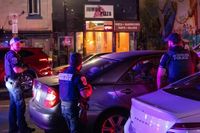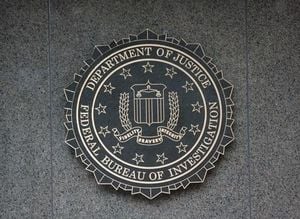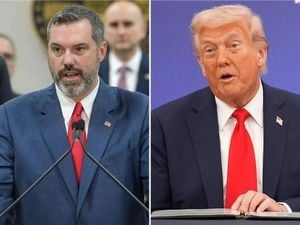Washington, D.C. has found itself thrust into the national spotlight this August, as President Donald Trump’s declaration of a “crime emergency” has triggered an unprecedented federal intervention in the city’s policing and politics. The move, executed through the rarely used Section 740 of the Home Rule Act, has not only sparked legal battles and public protests but also rippled through the city’s vibrant LGBTQ community, raising questions about civil liberties, local autonomy, and the future of D.C.’s hard-won self-governance.
On August 14, 2025, President Trump invoked Section 740, citing what he described as rampant crime in the nation’s capital. Attorney General Pam Bondi followed up that evening with an order attempting to take over the Metropolitan Police Department (MPD) and dictate its policies. This marked the first time Section 740 had been used since the Home Rule Act’s creation in 1973, a law that gave D.C. the right to govern itself, albeit with certain congressional checks. Trump’s executive order declared that “bloodthirsty criminals” were overrunning the city, referencing homicide rates from 2023 as justification for the federal action.
However, those claims have been met with sharp skepticism—and outright refutation—by local leaders and national observers. According to the Washington Blade, Department of Justice statistics indicate that violent crime in D.C. is at a thirty-year low. Metropolitan Police Department data shows a 26 percent decrease in violent crime, a 12 percent drop in homicides, and robberies down nearly 30 percent compared to the previous year. Critics have accused the Trump administration of using outdated numbers and stoking fear to justify what they see as a political power grab.
The city’s response was swift and forceful. D.C. Attorney General Brian Schwalb and Mayor Muriel Bowser filed a lawsuit challenging Bondi’s order, arguing that it “exceeds the narrow delegation that Congress granted the President [under Home Rule].” The suit emphasized that there was no legitimate emergency and warned that the Bondi Order “threatens to upend the command structure of MPD and wreak operational havoc within the department, endangering the safety of the public and law enforcement officers alike.” The lawsuit further stated, “There is no greater risk to public safety in a large, professional law enforcement organization like MPD than to not know who is in command.”
By the afternoon of August 15, a hearing was underway before U.S. District Judge Ana Reyes on a temporary restraining order to halt parts of Bondi’s directive. Judge Reyes didn’t mince words, making clear from the bench that the federal government’s attempt to take over MPD would not stand. If the Justice Department did not amend the order, she said, she would enjoin that aspect herself. Facing the prospect of judicial intervention, the Department of Justice withdrew the “takeover” portion of Bondi’s letter before the deadline. However, the remainder of the order—specifically, provisions that negate D.C. law preventing cooperation with Immigration and Customs Enforcement (ICE) and the “emergency” rationale—remain in effect and are set to be litigated further in the coming week.
Meanwhile, the impact on the ground has been immediate and visible. Since August 11, federal law enforcement presence in D.C. has surged, with FBI agents seen outside well-known LGBTQ hotspots and unarmed National Guard members stationed at federal monuments. ICE agents have set up random checkpoints across the city, a move that legal experts have described as legally dubious. According to The Washington Post, at one such checkpoint on 14th and W Streets, agents detained at least two people, one of whom was loaded into an unmarked vehicle as bystanders jeered and shouted at officers to “read the Constitution.”
Local residents haven’t taken these developments lying down. Protests have sprung up across the city, with D.C. residents organizing to oppose what many view as an unlawful federal incursion. As Jen Rubin noted in her Contrarians column, “What happens in D.C. will not stay in D.C.” The city has become a battleground for democracy, much like the ongoing legal fights in Texas over gerrymandering and representation for communities of color.
The LGBTQ community, in particular, has felt the effects of the increased federal presence. The Washington Blade reports that the ACLU of the District of Columbia has been actively advising LGBTQ individuals—both documented and undocumented—on their rights and how to stay safe amid heightened law enforcement activity. Monica Hopkins, executive director of ACLU-DC, emphasized the importance of knowing one’s rights: “You have the right to remain silent, but you must verbally invoke this right. So you have to say, ‘I’m invoking my right to be silent,’ or ‘I want to be silent.’ If stopped by police, you should ask, ‘Am I free to leave?’ If the answer is yes, then you should walk away calmly. If the answer is no, ask, ‘Am I under arrest?’”
Hopkins further explained the difference in rights when stopped by D.C. police versus ICE, noting, “If you are stopped by the D.C. police, you have the right to an attorney. If you are stopped by ICE, you have the right to consult with an attorney, and you can also request a list of free and low-cost legal help.” She encouraged residents to review warrants carefully if law enforcement attempts to enter their home or business, stressing that only a warrant signed by a federal judge or magistrate is valid for entry.
Beyond legal advice, the ACLU-DC has shifted its focus to congressional advocacy, meeting with lawmakers to explain the intricacies of D.C. home rule and to warn against what Hopkins called “a trial balloon” for potential federal overreach elsewhere in the country. “Our attention has been turned sort of on Congress. And we are having meetings with congressional staff explaining to them the intricacies of D.C. and D.C. home rule and why they should view this overreach and abuse of power by the president as just a trial balloon that you know this administration will undoubtedly try to enact across the country,” Hopkins said.
Amid this political turbulence, D.C.’s LGBTQ community continues to grow and thrive. On the corner of 14th and U Streets, a new queer bar called Revolt is set to open, promising an inclusive, high-energy nightlife space. Jonathon Rube, the bar’s head of operations, told the Washington Blade that Revolt aims to honor the area’s rich history—once known as “Black Broadway”—while creating a safe, welcoming environment for all. “Everybody within the LGBTQ+ community should have a safe space in any of these bars,” Rube said, emphasizing his approach to security and inclusivity.
Still, the city faces fiscal challenges as well. D.C. Mayor Muriel Bowser’s Office of LGBTQ Affairs saw its budget cut by $600,000 for fiscal year 2026, a reduction attributed to declining tax revenue and federal budget cuts. Despite the cut, most core programs—including housing vouchers and violence prevention—will continue, though special projects like the Black LGBTQ History Preservation Commission will see reduced funding. “Mayor Bowser remains firmly committed to all communities in D.C., and this budget reflects her continued support for programs that ensure residents can live safe, healthy, and affirmed lives,” said office spokesperson Gabby Vincent.
As D.C. residents brace for further legal battles and await the outcome of ongoing litigation, the city’s experience stands as a cautionary tale about the fragility of local autonomy and the enduring power of civic engagement. For now, the nation’s capital remains on edge—but also defiant, determined to defend its rights, its communities, and its unique spirit.




